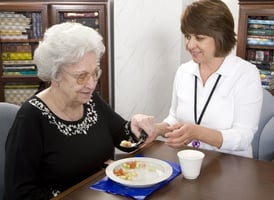There aren’t many one-stop shops when it comes to healthcare. With millions of Americans seeing a...
Mental Health, COVID-19, and Post Intensive Care Syndrome Webinar Summary
VNA of Ohio’s June Mental and Behavioral Health Webinar provided an overview of lessons learned by our team throughout the COVID-19 pandemic. Overall, our team has witnessed a steady rise in anxiety and depression within our community because of the shutdown and isolation.
Our Mental and Behavioral Health Services team also treated patients with severe physical and emotional challenges resulting from the COVID-19 virus and continue to help many of them manage their mental and behavioral health.
Our webinar included our mental health team and featured VNA of Ohio patient and guest presenter, Tim Quinn, a COVID-19 and post-intensive care syndrome (PICS) survivor. He continues to live with this not-often discussed diagnosis, PICS, which is characterized by a collection of physical, mental and emotional symptoms that continue to persist after a patient leaves the intensive care unit.
Tim Quinn is a robust lifelong athlete, father and husband that fell ill with COVID-19 and was admitted to the ICU after experiencing low oxygen levels and breathing difficulties. Like other PICS survivors, Quinn was eventually discharged from the ICU and continues to struggle with a long and complicated recovery, affecting him and his family.
An ICU hospital stay is often lifesaving, but it does expose patients to an often uncomfortable and stressful environment. This type of stay experienced during the COVID-19 pandemic included multiple challenges. Nurses and doctors were required to be dressed in personal protective equipment, making it hard to connect with them. Necessary social distancing policies added further complications to an already highly-monitored medical environment.
Typically, an ICU hospital stay includes multiple stressors such as:
- Sedation
- Intubation
- Restraint
- Constant noise
- Multiple lines and tubes attached to patient
- Lack of rest due to medical assessments
Patients, such as Quinn, who dealt with both these typical stressors, in addition to the COVID-19 regulations, continue to struggle with severe PICS challenges. It has been over a year since Quinn was admitted into the ICU for COVID-19 and, though he has regained much of his strength, he still contends with mental and physical weaknesses, decreased bodily sensations, and memory deficits.
Quinn explained that he had contracted COVID-19 and became seriously ill very quickly. He had needed to visit his local hospital twice for multiple rounds of IV fluids. Unfortunately, his blood oxygen levels did not rebound from this treatment and he had to be admitted to the hospital. Things escalated quickly and within a short amount of time he was taken into the ICU. Unfortunately, much of this happened while he was alone, his wife having expected a short overnight stay in the hospital, had run out on an errand. Instead, his ICU admittance was a drastic action taken quickly to save his life.
Quinn shared that his ICU experience included a 12 day medically-induced coma and intubation, during which Quinn faced hallucination, delusion, and paranoia. Once he came out of the coma, he found himself alone, restrained, and without feeling in his feet. Flooded with emotions, he did not respond well to the fully-masked and covered medical staff that tended to him. The emotional and physical impact of the stay continues to impact him today and he is plagued with ongoing PTSD symptoms including anxiety, depression, and memory loss.
Once home from the hospital, VNA of Ohio nurses cared for Quinn and his family members. Our physical therapist helped him relearn to walk and to slowly regain his strength. Quinn’s physical weakness surprised him, “even after a career as an athlete and former Olympian, I was only able to take 4 steps on my own before falling!” He is appreciative, if not always happy, that his VNA of Ohio practitioners “held him accountable and kept him on pace.” He states that they didn’t let him stop. “No matter how I felt, I had to do the work.”
He found the caretakers’ engaging and comforting support very helpful during his home-based healing process. “My therapists had to teach me how to get back to normal life, and they did a great job. They even played many memory games with me to help me get my speech back as well as my memory.”
Quinn concluded, “I am forever grateful for my VNA of Ohio nurses and therapists who supported me as well as my family,” Quinn offers, “my wife and boys had to do so much without me and they had to keep everything together. The specialists helped us handle this challenge as well.”
Amy Silbaugh, our webinar host and Director of VNA of Ohio Mental and Behavioral Health added to Quinn’s last comment that, “often, people don’t recognize the impact of an ICU experience on the family. It has been so disruptive and impactful that it has its own diagnosis. It is called PICS-Family and covers all the effects seen within the family system when a member goes through this experience.”
She continues, “we really need more awareness around the trauma that develops because of longer-term ICU hospital stays. The resulting complications within the family often initially go unnoticed because attention is focused on the patient’s physical recovery but the emotional and mental effects on the family eventually pop up, sometimes leading to secondary issues with substance abuse. We definitely now know that the more healthcare help you can get, the better the outcomes for everyone involved.”
In addition to this specific story, VNA of Ohio mental health team member, Tara Brown, shared a roundup of the increased mental and behavioral health challenges they’ve witnessed in the home healthcare field over the past 2.5 years.
- Many young adult mental and behavioral home healthcare patients have been resistant to taking COVID-19 precautions because of their “invincible” mentality.
- Many senior community members have experienced an increase in dementia symptoms as a result of the virus and have ended up in nursing homes because their partners could no longer care for them at home.
- Challenges to medication maintenance have caused an increase in risky behaviors. In those that have contracted COVID-19, we have seen some body chemistry changes that have decreased medication efficacy.
- A large increase in new onset mental and behavioral health conditions overall, an increase in drug use as a result of ongoing isolation, and increased levels of anxiety in our communities.
- Isolation resulting from social distancing has caused patients’ lives to become more singular. Community engagement opportunities have been greatly decreased and this has challenged patients with severe mental health conditions. These patients are having a harder time distinguishing reality from fiction because they are stuck at home.
Our home healthcare providers understand that everything with patient home healthcare is interconnected, the physical, emotional, and spiritual. The COVID-19 pandemic has shown us that mental and behavioral health conditions cannot be ignored and if you need help, it is best to ask for it, be it as a patient, caretaker, or family member. Whether facing a PICS recovery, ongoing and lifelong mental health challenges, or a newly onset condition, having an effective support network is key to survival.
VNA of Ohio’s Mental and Behavioral home healthcare team operates as one of only a few VNA programs in the state of Ohio. In addition, we offer multiple services beyond mental health programs including physical therapy, speech therapy, nursing, and social work. VNA of Ohio Mental and Behavioral healthcare services are unique in comparison to in-patient and outpatient settings because we offer support for you in your home, often surrounded by your family.
Silbaugh explained the unique qualities of our program. “There has been so much loss and it has been traumatizing, a lot of times people just need someone to talk to you. Our team provides this special service for our patients, we do not judge. Our main job is to be an advocate for our patients, we are there to link them to the resources they need to live life after our care ends. Mental and behavioral health conditions are a lifelong challenge, there is no cure, only treatment. There has been such a stigma around mental health issues and we are happy to see people are more open about these concerns now.”
As we all learn to navigate a new normal in this phase of the result COVID-19 pandemic, our mental and behavioral home healthcare team understands how to help us all move forward. In addition to Silbaugh’s advice, it is helpful to remember a tip that Tim Quinn learned from his home healthcare caretakers. “My nurses told me it is important to find something that you enjoy doing, something you found satisfaction in completing before COVID-19, then get back out there and do your thing,” and though Quinn chuckled as he made this point, we all recognized that action is a serious aspect of the healing process. Collectively, we all need to take action and journey forward to recover, especially after these difficult pandemic years.
If you notice that you or someone you love is struggling and unable to bounce back, the VNA of Ohio Mental and Behavioral healthcare team can help.
We will care together for you, it’s our mission.
Contact us today.



